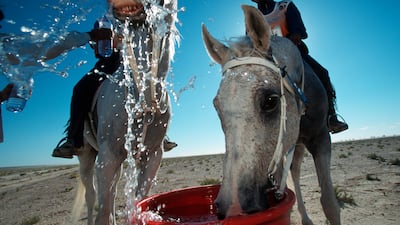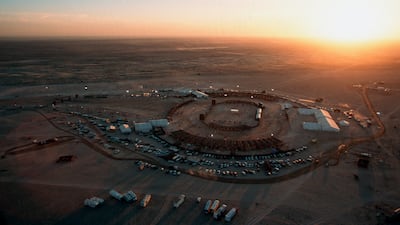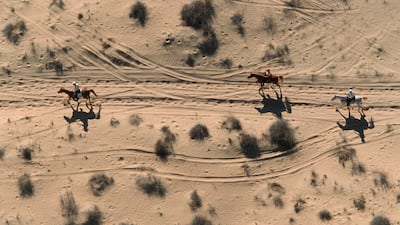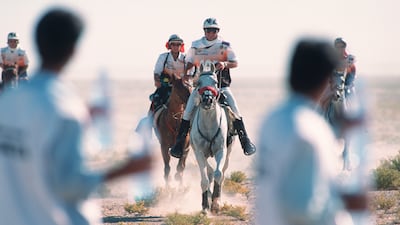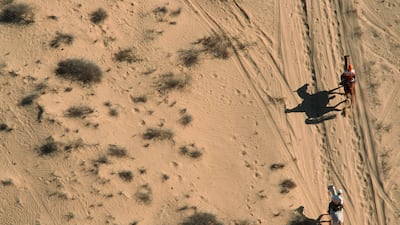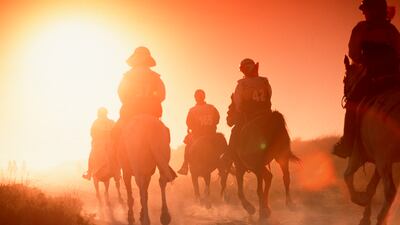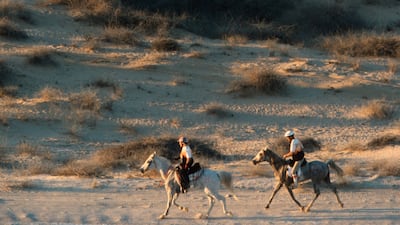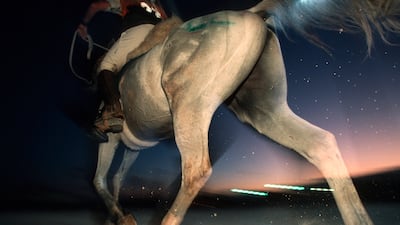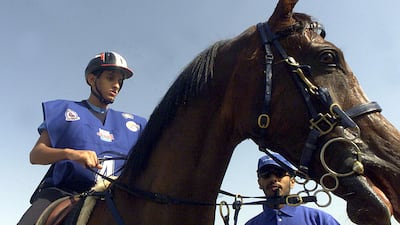On December 10, 1998, the UAE cemented its growing commitment to the sport of endurance horse racing in the most spectacular fashion — hosting the International Federation for Equestrian Sports (FEI) World Endurance Championship.
Centred on Ghantoot Racing Club, with 162 riders from 37 countries competing, the event set a Guinness World Record for the largest number of participants at an official world championship event.
The event was made all the more remarkable by how young the sport was in the UAE at the time — having only been introduced to the country by the UAE Founding Father, the late Sheikh Zayed bin Sultan Al Nahyan, in 1992. However, it was a natural fit for a people who had, for millennia, cherished horse-riding not only as a sport and passion, but a way of life; with horses and camels not just a means of transport, but an extension of the rider.
The UAE’s first two endurance marathons, open to camels and horses, were held in January 1993 and March 1994 — with the first horse-only race, Al Asayl Endurance Race, setting the blueprint for things to come in December 1994. That year, Sheikh Zayed set up the Presidents Cup for Arabian horses, helping to raise the breed’s international profile in the years since.
On February 25, 1998, the UAE Equestrian and Racing Federation organised its first CEI-A 160km ride, which was won by Sheikh Mohammed bin Rashid, Vice President and Ruler of Dubai — who was Crown Prince of Dubai and Minister of Defence at the time. Fans of the sport were looking forward to December, as the UAE geared up to host its first international endurance race.
The FEI World Equestrian Games were originally scheduled to take place in Dublin, Ireland. Discussing the planning for such an elaborate enterprise, Prince Philip, the Duke of Edinburgh, said: "Three years is insufficient for any federation to put together the very large and sophisticated organisation that is needed to manage such an event.”
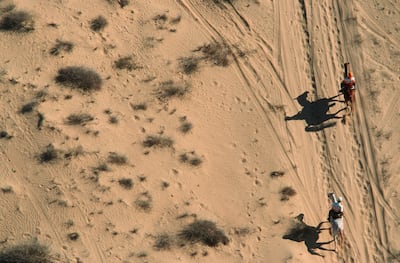
Ireland fell victim to organisational issues, and despite a £2 million rescue package from Nissan, was forced to hand over the duty to Rome — with the endurance race going to Dubai.
The fact that the UAE, a country where formal endurance racing had existed for only six years, was able to arrange a competition at all was a marvel. That it was able to surpass all previous events was nothing short of miraculous.
In December, competitors from across the world flocked to Dubai’s Jazira Beach Hotel, just five minutes from the stabling venue. From there, they dispersed to a network of hotels supporting the event. The competition marked the first time time control was fully computerised, with riders using plastic swipe cards to register their arrivals at each stage of the ride.
The website Endurance.net has preserved some of the memories of those who were there. Monika Smith, a member of Team Canada, said the UAE deserved a “big round of applause” for hosting a “fabulous event” at such short notice.
At a time when Dubai was still emerging on to the global stage, she was pleasantly surprised by the familiarity of the city’s malls, and overwhelmed by the country’s courtesy. Smith added: “I didn't see any graffiti, suffered no harrassment, no loose dogs. As a single woman, this was a city I felt safe in.”
On the way to the stadium, she described scenes of excitement, as groups of Emiratis drove past, their cars adorned with UAE flags, honking horns, laughing and waving. “And we waved and yelled back; what a welcome!”
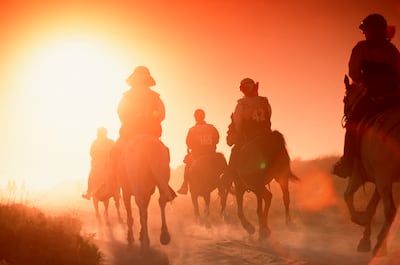
She recalled the “thrilling” finish to the race: “To see Valerie Kanavy come galloping in flat out, closely followed by a very determined Italian [Fausto Fiorucci] and a 'dark-horse' Japanese competitor [Daisuke Yasunaga] a couple of minutes later was amazing. Twenty minutes later, two UAE competitors raced in together — doing their country proud. What a finish!” Among the two Emiratis was Sheikh Hamdan bin Mohammed Al Maktoum, Crown Prince of Dubai and future endurance champion. Of the record 162 participants, only 78 completed the 160km ride.
A 2000 issue of Aramco World included a quote from the winner, Kanavy, who described the joy of riding in the UAE’s desert landscapes: “I think that when people dream about horses, about riding them, what they dream about is something like this — this feeling of freedom, of wide-open spaces."
Heidi Smith, from Oregon, called Ghantoot Race Course, where the horses were stabled, “an absolutely phenomenal facility”. She said: “To make the quarantine situation more workable, North American horses were housed in one area, South Americans in another area, Europeans in another area, and so forth.
"If someone from Europe had a North American horse leased, or some other combination, that person became a bit of an orphan as his or her horse would be housed in the barn from its own continent, and had to vet in with them.”
Watching the closing ceremony, she said she was “about ready to deck the next American who said anything about civilisation only arriving recently in the desert”, adding “these cultures had irrigation systems, lighted streets, and codes of law when my European ancestors were still wearing skins and trying to keep the fire lighted in the cave in the winter”.
Deemed a roaring success, the event marked a major milestone in the country’s sprint to the front of the pack — running alongside the Dubai World Cup.
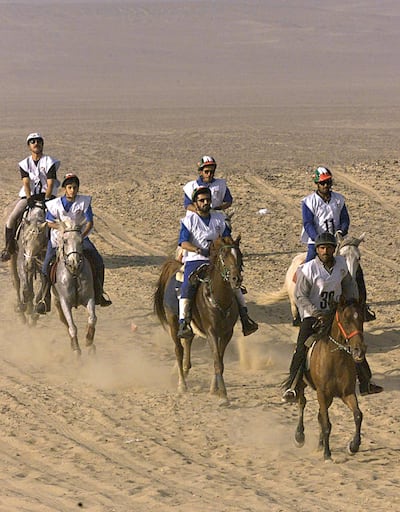
Since then, Emirati riders have risen to the forefront of the sport. In 2004, when the UAE hosted the FEI championships again, Sheikh Mohammed and Sheikh Hazza bin Zayed, deputy chairman of Abu Dhabi Executive Council, took to the podium with the winner, Barbara Lissarague of France. Sheikh Mohammed and Sheikh Hazza made the podium again when Dubai hosted the event in 2005.
Having previously won the 2001 Al Ahram International Endurance Championship in Egypt, in 2012 Sheikh Mohammed won the individual gold medal at the World Endurance Championships in the UK. With Sheikh Rashid Dalmook Al Maktoum and Ali Khalfan Al Jahouri in second and third respectively, the UAE took all three top medals.
It followed successive UAE wins in 2008 and 2010. "The weather could have been worse, but God was kind and gave us some good conditions in which to race," Sheikh Mohammed told Dubai Racing after the win. "This feels great." Meanwhile, Sheikh Hamdan also won gold at the 2014 Altech FEI World Equestrian Games in Normandy.
Next year the UAE is scheduled to host the Endurance World Championship again, at Butheeb International Endurance Village, which is renowned for its state-of-the-art facilities, veterinary staff and laboratory technicians.
Remarking on the decision to award the championship to Butheeb, FEI President Ingmar De Vos said: “The FEI Board was impressed with the world-class permanent infrastructure and facilities offered by the BIEV and the proven ability of the organisers to guarantee all the logistical organisation for our human and equine athletes in a short period of time.”
Although today the UAE has repeatedly proved its ability to host endurance events on the highest level, in 1998 things were not so certain. However, shortly after the event, Marcy Pavord from England told Endurance.net: “It was an incredible event and I think we'll all be talking about it for a long time to come.” As the country prepares to host yet another championship, it appears she was correct.
Scroll through images of Sheikh Mohammed winning the 2001 Al Ahram International Endurance Championship below
